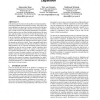Free Online Productivity Tools
i2Speak
i2Symbol
i2OCR
iTex2Img
iWeb2Print
iWeb2Shot
i2Type
iPdf2Split
iPdf2Merge
i2Bopomofo
i2Arabic
i2Style
i2Image
i2PDF
iLatex2Rtf
Sci2ools
104
click to vote
ICAIL
2003
ACM
2003
ACM
Using Ontologies for Comparing and Harmonizing Legislation
In the last decades the interest in the problem of comparing and harmonizing legislation has been steadily increasing. One reason is the increasing legal convergence between governments in the European Union, and the increasing traffic of people over borders of jurisdictions. Another reason is the increasing globalization of companies; Products and services are offered in many jurisdictions at the same time, and the product or service has to meet the provisions of all jurisdictions in which it is offered. In the E-POWER project relevant tax legislation and business processes are modeled in UML to improve the speed and efficiency with which the Dutch Tax and Customs Administration can implement decision support systems for internal use and for its clients. These conceptual models have also proven their usefulness for efficient and effective analysis of draft legislation. We are currently researching whether conceptual modeling can also be used to compare ‘similar’ legislation fr...
| Added | 05 Jul 2010 |
| Updated | 05 Jul 2010 |
| Type | Conference |
| Year | 2003 |
| Where | ICAIL |
| Authors | Alexander Boer, Tom M. van Engers, Radboud Winkels |
Comments (0)

